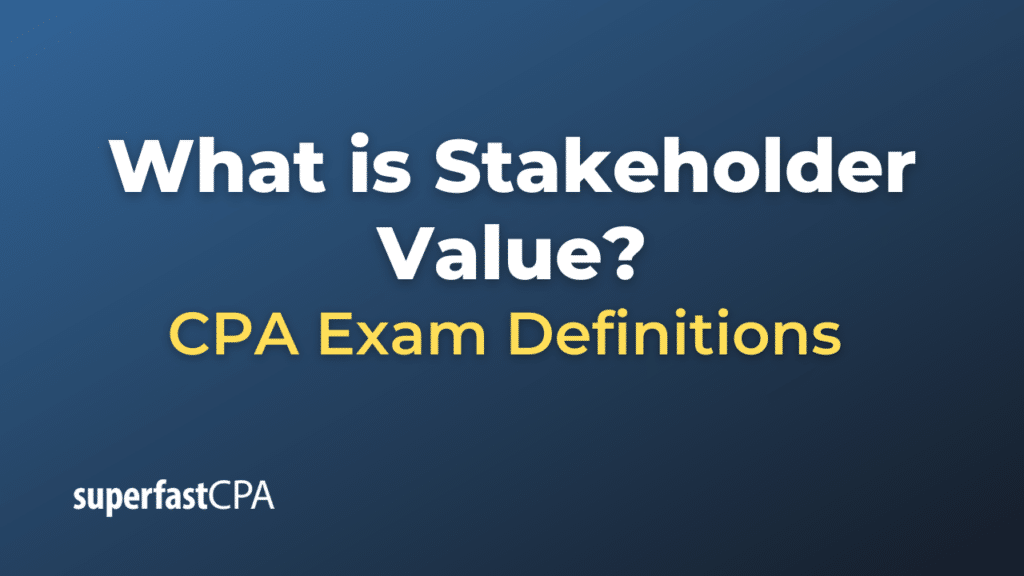Stakeholder Value
Stakeholder value is a broad management concept that focuses on creating value for all stakeholders involved with a business, rather than concentrating solely on maximizing shareholder value. The idea is rooted in Stakeholder Theory, which posits that businesses have a responsibility to various parties that either affect or are affected by the company’s operations, not just to those who hold its shares.
Stakeholder value suggests that companies should take into account the interests of a wide array of groups when making decisions, including:
- Shareholders: Those who have invested capital in the company and expect a return on their investment.
- Employees: Individuals who work for the company, expecting fair wages, benefits, and safe working conditions.
- Customers: Those who use or buy the company’s products or services.
- Suppliers: Entities that provide the company with materials, products, or services.
- Community and Society: This includes local communities where a company operates and broader societal entities that can be impacted by a company’s actions.
- Government and Regulators: Institutions that set policies, rules, and regulations the company has to follow.
- Environment: Given the rising awareness of environmental issues, many companies now include the environment as a stakeholder, striving to reduce their ecological footprint.
- Other relevant parties: Depending on the business and context, other groups might also be considered stakeholders, such as NGOs, industry associations, or competitors.
By focusing on stakeholder value:
- Companies can mitigate risks: Addressing stakeholder concerns proactively can prevent potential crises or public relations disasters.
- Build trust and reputation: By considering a broader set of interests, companies can foster better relationships with their communities, customers, and other groups.
- Drive innovation: By understanding diverse stakeholder needs, companies might uncover new business opportunities or innovative solutions to problems.
- Promote long-term growth: While maximizing shareholder value might emphasize short-term profits, stakeholder value promotes sustainable, long-term growth.
In practical terms, to embrace stakeholder value, a company might engage in community outreach, invest in employee training and well-being, adopt sustainable business practices, and maintain open dialogue with various stakeholder groups to ensure their concerns and needs are addressed.
Over the years, with the rise of corporate social responsibility (CSR) and the emphasis on sustainable business practices, the focus on stakeholder value has gained considerable traction in the business world.
Example of Stakeholder Value
Let’s use a fictional example of a coffee company to illustrate the concept of stakeholder value:
Scenario: “BeanBright Coffee Company”
BeanBright Coffee Company sources coffee beans globally and roasts and sells them in various locations worldwide.
Stakeholder Value in Action:
- Shareholders: BeanBright ensures consistent profitability by investing in sustainable farming practices, which secures a long-term supply of high-quality beans. This approach keeps shareholders content with steady returns on their investment.
- Employees: The company offers above-average wages, comprehensive training programs, and benefits like health insurance and retirement plans. They also promote a diverse and inclusive work environment, leading to higher job satisfaction and lower staff turnover.
- Customers: BeanBright invests in quality assurance and offers a loyalty program. They also ensure transparency by detailing the origins of their beans, educating customers on their sustainable sourcing practices.
- Suppliers: BeanBright works closely with coffee farmers, ensuring they receive fair prices for their beans. The company also invests in farming communities, offering education and infrastructure support.
- Local Community: In cities where they have stores, BeanBright sponsors community events and initiatives. They also provide spaces in their coffee shops for local artists to showcase their work and for community groups to meet.
- Environment: The company uses biodegradable packaging and encourages customers to use reusable coffee cups by offering discounts. They also fund reforestation projects in coffee-growing regions.
- Government and Regulators: BeanBright ensures compliance with all local and international trade regulations. They also collaborate with governments in coffee-growing regions to support local agriculture.
- NGOs and Industry Groups: The company partners with environmental and fair-trade NGOs to improve their sustainability and fair-trade practices. They also participate in industry forums to share best practices.
Over time, these initiatives lead to:
- Increased customer loyalty and trust.
- Positive brand image and reputation.
- Employee pride and dedication to the company.
- Strong, reliable relationships with suppliers.
- A positive impact on the environment and communities.
- Sustainable long-term growth and profitability.
This scenario demonstrates how focusing on stakeholder value – rather than just shareholder value – can result in a thriving business that benefits a wide range of groups. It shows that profit and responsible business practices can coexist harmoniously.













